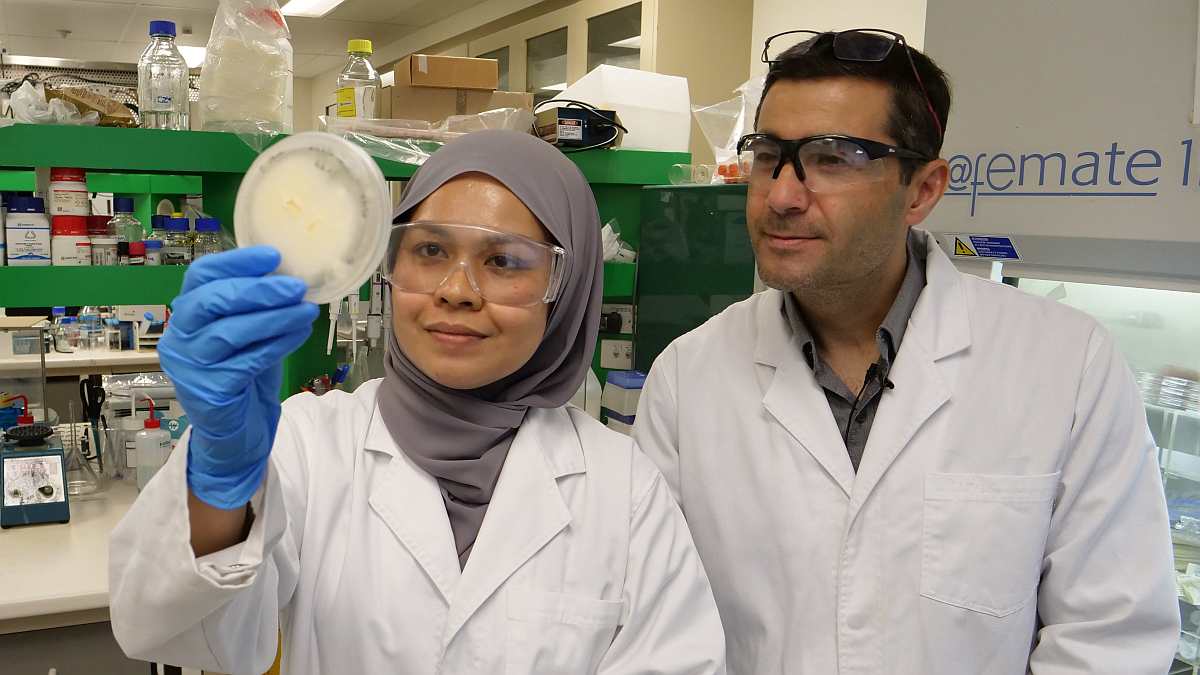Science
Related: About this forumScientists find fungi that can eat plastic
12 May 2023 / Matthew Ward Agius

Amira Farzana Samat and Ali Abbas inspect a petri dish of Engyodontium album attacking polypropylene. Credit: Matthew Ward Agius/Cosmos
Researchers have found fungi that eat up widely used plastics and are now trying to scale up the process.The fungi studied in the research are common in nature – Aspergillus terreus, a soil mould and Engyodontium album – and have special enzymes that aid the breakdown of plastic.
Both can break down polypropylene, a cheap and flexible plastic used to make packaging, car parts and batteries, and is widely used in other industrial manufacturing.
The use of plastics, especially industrially, is unlikely to conclude any time soon. But with increased public awareness of the role of plastics in ecosystem pollution and as an end-product of fossil oil use, demand for less environmentally impactful materials is increasing.
To test whether their fungi would chew through plastic, the researchers pre-treated polypropylene samples with heat, ultraviolet light or Fenton’s reagent (a solution of hydrogen peroxide and iron).
More:
https://cosmosmagazine.com/earth/sustainability/scientists-find-fungi-that-can-eat-plastic/
Wasn't there a bacterium that did an equivalent sort of thing discovered a couple of years ago? (Don't recall if it attacked the same polymer.)
Do wonder how common these fungi are in local-to-me soils (and don't feel motivated enough to spend the 20 seconds necessary to find out).
Judi Lynn
(160,918 posts)Hungry, hungry enzymes.
BY NEEL V. PATEL | PUBLISHED APR 17, 2018 11:30 PM EDT
The natural world is rapidly becoming a giant pile of plastic waste. There are literally six—six!—ungodly large garbage patches swelling in the ocean. Even areas as far removed from us as the Arctic are not safe. We’re slowly suffocating a lot of natural ecologies with our trash. Fish, birds, and other animals all unwittingly consume the five trillion tons of plastic (and counting) strewn about the ocean, and doing so can kill them.
Scientist are trying to come up with novel solutions to remedy the plastic pollution crisis, and they’re thinking small—in a good way. In a new study to be published in the Proceedings of of the National Academy of Sciences this week, a team of international scientists illustrate how they created—by accident—a new enzyme capable of breaking down plastic bottles. This providential development could finally allow us to fully recycle plastic drink bottles for the first time ever, putting a much-needed dent in plastic pollution increases.
The new study’s origins are tied to the 2016 discovery of a bacterium in a Japanese waste dump that had evolved to use PET (polyethylene terephthalate), commonly used in the 1 million soft drink bottles sold every minute around the world, as an energy source. The team of scientists originally began running tests to see how the bacterium, Ideonella sakaiensis, managed to produce an enzyme capable of degrading PET. Those tests, it turned out, inadvertantly made the enzyme, PETase, even better at degrading PET. The resulting mutant PETase now takes just a few days to break down PET, compared to the 450 years it takes for the stuff to degrade naturally.
The salient takeaway is to use PETase to break down bottles before they end up in the environment. However, the enzyme could also augment plastics recycling approaches themselves. “Current recycling strategies for PET bottles mostly focus on mechanical recycling, so they chop the bottles up and use them for applications that typically do not need the same materials requirements as bottles,” says study co-author Gregg Beckham, a researcher at the U.S. Department of Energy’s National Renewable Energy Laboratory. “Engineered enzymes that break PET down to its building blocks would enable the ability to do full bottle-to-bottle recycling,” which would hopefully help decrease oil drilling demands for new plastic production.
More:
https://www.popsci.com/bacteria-enzyme-plastic-waste/
Judi Lynn
(160,918 posts)Experts have asked whether the new find could be an answer to managing plastic waste in the environment
Alexandra Sims
Saturday 12 March 2016 15:39
A new species of bacteria able to eat one of the world's most common plastics has been discovered by Japanese scientists. Polyethylene terephthalate, or PET, is the plastic commonly found in disposable water bottles. Lightweight, colourless and strong it is widely used, with 50 million tonnes produced globally every year.
Published in the journal Science, the discovery by researchers from Kyoto Institute of Technology and Keio University, could be a breakthrough in managing the plastic, which is notoriously resistant to being broken down by microbes or biodegradation.
To find the bacteria, a team of researchers collected 250 PET-contaminated samples including sediment, soil and wastewater from a plastic bottle recycling site. They screened the microbes living on the samples to investigate whether any of them were eating the PET and using it to grow.
They found a consortium of microbes that appeared to break down a PET film, however just one of the bacteria species, named Ideonella sakaiensis, was responsible for PET degradation.
More:
https://www.independent.co.uk/news/science/bacteria-able-to-eat-plastic-bottles-discovered-by-scientists-a6927636.html